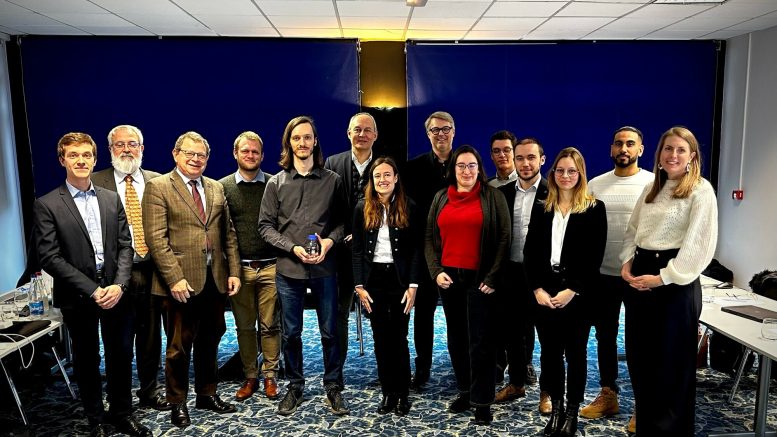The CLEE Project: Flow chemistry joins forces with AI to optimise production of high-energy liquid fuels
The CLEE Project, funded by the French Defence Innovation Agency in October 2022 and led by Alysophil, MBDA and Inria, is aimed at the continuous-flow* production of high-energy liquid fuels, as well as new fuels, driven by artificial intelligence. On 14 February 2023, in Strasbourg, the partners in the project unveiled promising initial results, along with a first sample of the reference fuel, produced in Alysophil’s laboratory.
The CLEE Project†, which emerged from an MBDA Innovation Lab in 2019, was born out of a need—to make maximum use of the energy generated by a fuel, and to control its availability—and an encounter with the French SME Alysophil, founded in 2018. This foresight project seeks to remove the various obstacles to the future evolution of fuels for air-breathing jet engines, particularly in the field of missile propulsion.
After discussions between MBDA, Alysophil and the French Ministry of the Armed Forces, based on a theoretical feasibility study conducted between 2019 and 2021, a funding programme was set up by the French Defence Innovation Agency (AID) under the RAPID initiative (for Régime d’APpui à l’Innovation Duale, Dual Innovation Support Scheme). Inria then joined the project in order to contribute its scientific expertise.
The project has the dual objective of producing a laboratory demonstrator and paving the way for industrial scale-up. Within five years, a user such as MBDA France could have an industrial installation, controlled by artificial intelligence and located in a “maritime” container, enabling it to produce up to 10 tonnes of fuel a year to meet its own needs. This continuous-flow chemistry unit could, by virtue of its design, be adapted to produce other fuels in a safe and flexible manner.
In October 2022, teams from MBDA, Alysophil, Inria and AID came together to jointly define the need, identify and exploit the databases, then select and optimise the fuel production algorithms. The initial results of the project are very tangible, with a first sample of the reference fuel produced and analysed in the Alysophil laboratory. The second phase of the project—the construction of the pilot chemistry unit—is already underway and will enable the production of a laboratory demonstrator within two years, in preparation for the industrial scale-up.
Denis Gardin, VP Innovation and Future Technologies at MBDA: “This study provides further proof of the possibilities offered by artificial intelligence; its ability to discover new molecules by simulating millions of combinations dramatically increases the speed at which we identify new products, as well as their effectiveness. Beyond the interest that AI represents for controlling chemical reactions in continuous flow, it also enables MBDA and Alysophil to discover new ways to improve the performance of future missiles still further, and also to adapt the tool to produce other fuels.”
Philippe Robin, President of Alysophil: “This partnership combines the know-how of three organisations that are experts in their own fields, with the aim of discovering new fuels and producing them locally in a safer and more environmentally responsible way. This initiative is supported by the Defence Innovation Agency, which shares our conviction that supply chains for strategic substances need to be secured through local, flexible and resilient production.”
Frédérique Segond, Director of the Inria Defence and Security Mission: “The CLEE project is fully in line with two of Inria’s priority areas of application, namely Defence and the Environment. It also illustrates perfectly the duality of Inria’s technologies, by applying natural language processing (NLP) techniques to chemistry. Through this collaboration, Inria Defence and Security is pursuing its objective of supporting France’s industrial ecosystem, by meeting the application needs of a DTIB firm—MBDA—and supporting the scientific approach of a French SME, Alysophil.”
Source : MBDA






Be the first to comment on "Flow chemistry joins forces with AI to optimise production"